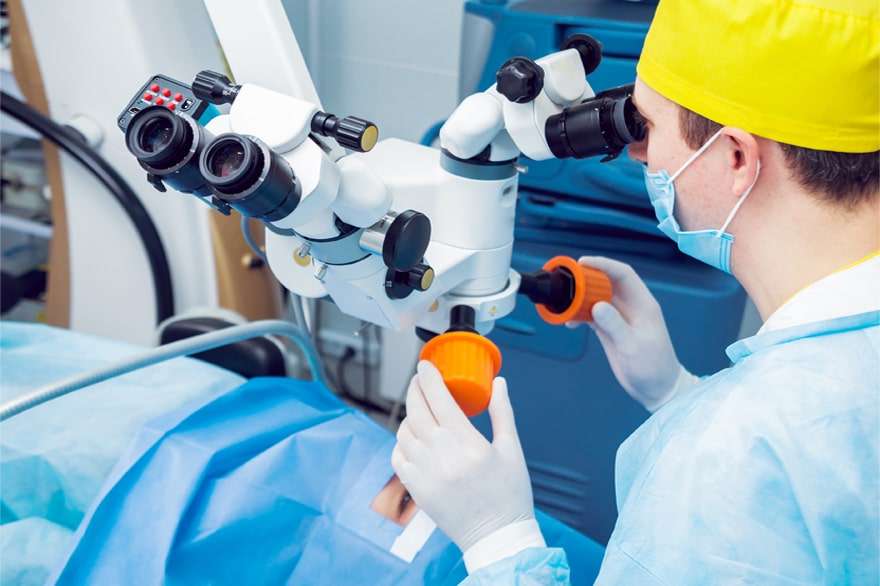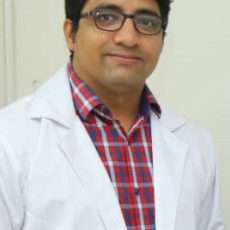All Departments
- Cataract Surgery
- Comprehensive Eye Tests
- Ear Conditions
- Eye Surgeries
- Facial Paralysis
- Head & Neck Surgery
- Laryngology
- Micro Ear Surgery
- Nose Conditions
- Nose Surgery
- Paediatric ENT
- Sleep Apnea & Snoring
- Throat Conditions
- Thyroid Diseases & Surgery
- Vertigo
- Vision Tests
Opening Hours
- Monday - Saturday: 9.00 am - 2.00 pm, 5.00 pm - 9.00 pm

Cataract Surgery
CATARACT
A cataract is a cloudy area that can gradually develop over the lens of your eye, making your vision blurry and dull. Among many other causes, cataract due to ageing is the most common.
The cornea (the clear outer layer at the front of the eye) and the lens (second part of the eye located behind the iris and the pupil) are responsible for refracting or focusing light on to the retina (back wall inside the eye). The retina contains nerve cells that transmit electrical signals to the brain, which interprets the image as you see.
Cataracts cause reduced vision because the cloudy lens prevents the light to pass through and be focused on the retina. In young people, the lens of the eye is flexible and clear and can adjust or accommodate to allow us to see close or far away. By middle age, many people start noticing difficulty with their reading vision as the lens of the eye has stiffened and is no longer able to accommodate to see up close.
As time passes on and the lens becomes cloudy, people may experience difficulty at night while driving, decreased color perception, and blurred vision. You may also have the feeling that your vision is just as sharp as it was, among the symptoms of a cataract.
Some types of cataract may develop quickly while others more slowly. A change in the prescription of the eyeglass can sometimes help improve your vision but eventually, the cataract can reach a point where changing the prescription of the eyeglass is no longer helpful.
The only option at this point to restore your vision is to remove the cataract surgically. Replacing the removed cataract with an intraocular lens implant (IOL) and will take away the cloudiness and help restore the focusing power your eye had before the cataract formed.
Signs and symptoms of cataracts include:
- Clouded, blurred or dim vision
- Increasing difficulty with vision at night
- Sensitivity to light and glare
- Necessity of brighter light for reading and other activities
- Seeing “halos” around lights
- Frequent changes in eyeglass or prescription of the contact lens
- Fading or yellowing of colors
- Double vision in a single eye
If reduced vision interferes with your daily activities, you might need cataract surgery. Fortunately, cataract surgery in general is a safe and effective procedure to improve your vision.
Surgery is done to correct the condition, usually in less than an hour. The doctor replaces your cloudy lens with an artificial one. This operation is also an outpatient procedure. Initially, your vision will be blurry but improve in a couple of days. Your eyes may feel itchy and uncomfortable while they heal.
Types of Cataract Surgeries
The cataract surgeries are of two types that your doctor can explain to help determine which is better for you:
Phacoemulsification, or phaco:
A modern cataract surgery method in which a surgeon makes a small incision on the side of the cornea, the clear, dome-shaped surface that covers the front of the eye and inserts a tiny ultrasonic probe into the eye. This device emits ultrasound waves to soften and break up the cloudy lens into tiny fragments so that it can be removed by suction. Phacoemulsification, also called “small incision cataract surgery”, is the most effective and common method of cataract surgery done today.
Micro-incision cataract surgery (MICS)
Micro-incision cataract surgery (MICS) is an approach to cataract surgery through an incision less than 1.8 mm, as against a 12-14 mm incision in conventional cataract surgery (called extracapsular cataract extraction) to reduce surgical invasiveness, improving at the same time surgical outcomes. Regardless of grade and severity, all kinds of cataracts are amenable to treatment with microincision cataract surgery.
Microincision cataract surgery (MICS) was mentioned for the first time in Spain as a new concept of cataract surgery based on bimanuality, new tools, fluidics and a smaller corneal incision. Compared to MICS, conventional phacoemulsification uses a larger corneal incision. Separated irrigation and aspiration handpiece ensure using fluidics as a powerful tool and in this way use, less ultrasound or phaco energy during each surgery.
Advantages:
The confirmed advantages of MICS are mainly the avoidance and control of surgically induced corneal astigmatism and the decrease of postoperative corneal aberrations. MICS provides better postoperative outcomes than standard small incision phacoemulsification and has demonstrated to be a minimally traumatic surgery that
- Smaller incision results in faster healing and vision recovery
- Decreased chances of surgically induced astigmatism (SIA)
- Less need for glasses after surgery
- Compatible with premium IOLs, therefore better vision outcomes each time
- No need for anesthesia injections, stitches, bandages.
- Less follow up visits after MICS and no prolonged restrictions.
- Can go back to your normal daily routine quickly
FEMTOSECOND LASER
Femto Laser-Assisted Cataract Surgery or FLACS is another option available for your doctor to use during cataract surgery. This computer-guided laser procedure replaces many of the steps during cataract surgery that requires a blade and softens the cataract, allowing for a smoother and easier removal. A new lens will be placed in your eye following a small ultrasound probe that breaks up and removes your cataracts. It can also be used in procedures done to correct astigmatism.
WHEN TO SEE A DOCTOR
If you notice sudden vision changes, such as sudden eye pain, double vision or flashes of light or sudden headache, see your doctor immediately.
Dr Aravind’s ENT and EYE Hospital has a highly skilled cataract surgery team and also is equipped with the latest cataract surgery machines and technology to take care of your cataract surgery requirements.
Contact Dr Aravind’s ENT and EYE Hospital, Suchitra – Kompally, for an appointment today.
Meet Our Doctors

Dr. Aravind Kumar Alwala
MBBS (Osm)., MSENT specialist, Chief Endoscopic Sinus Surgeon
Make an Appointment
Dr. Laxmi Priya Pallapolu
MBBS (Gold Medalist)., MS Ophthal (FICO)Consultant Ophthalmologist, Chief Phaco Surgeon
Make an Appointment